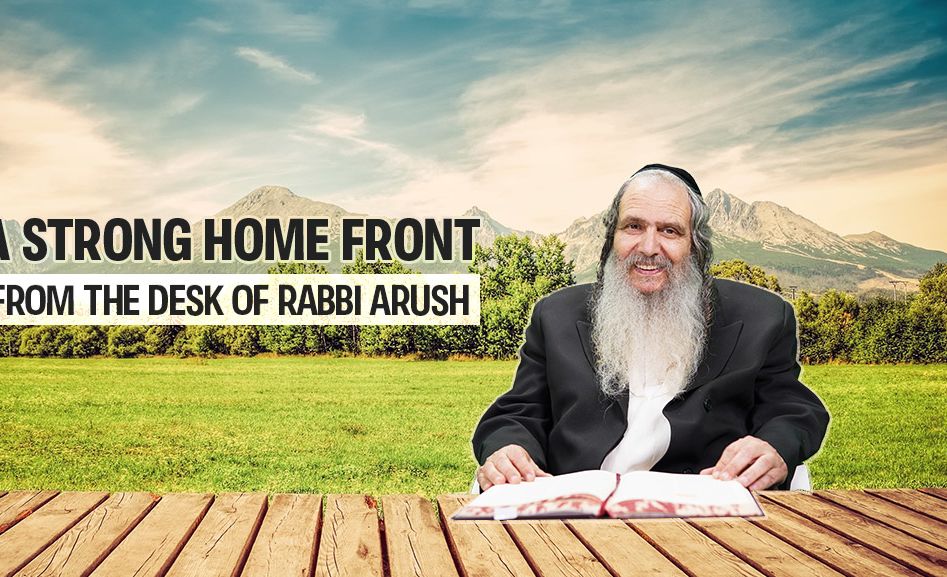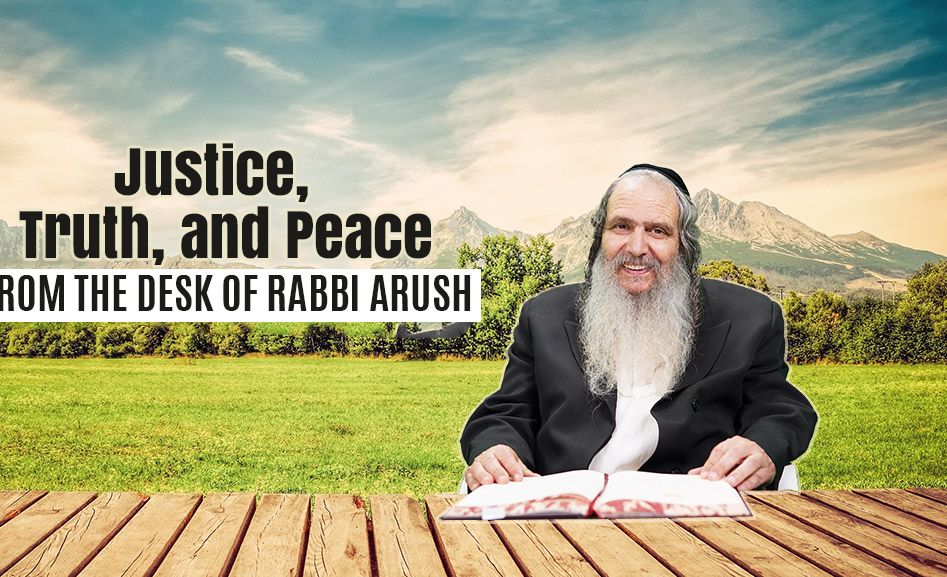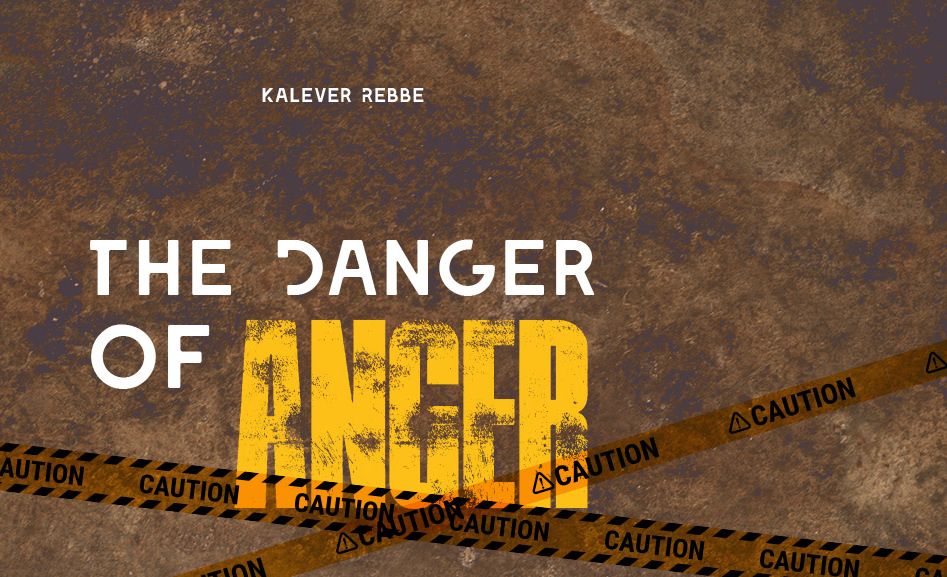
Where is Your Mishkan?
How important is peace in the home? Everyone would agree that it's very important. So why is peace in Jewish homes going downhill? Because some things are even more important - like "truth" and "justice"! Rabbi Arush explains...

Translated from Rabbi Arush’s feature article in the weekly Chut shel Chessed newsletter. The articles focus on his main message: “Loving others as yourself” and emuna.
Order at the Seder table
The disciples who accompanied the righteous rabbi to his home were more excited than usual, and not only because it was the holy night of the Pesach Seder. They had worked very hard so that their rabbi and teacher would be able to enjoy the satisfaction and comfort that he deserved.
They were well familiar with the difficulty the rabbi was coping with in his home: his wife was suffering from a mental disorder that caused her to horde objects, to the point that the whole house was full of junk that interfered with the home’s functioning and routine. The rabbi lived in a sea of disorder.
When Pesach was approaching, the disciples were concerned: How will their rabbi be able to prepare properly for the holiday calmly and have a clean and neat house? They approached the rebbetzin and offered to help her with the preparations for Pesach. What Jewish woman would refuse such an offer?
As they were cleaning, they talked to the rebbetzin and tried to convince her to throw away at least a small part of the junk, in the hopes of clearing out the main room of the house so that the Seder could be held there. They were very happy when the rebbetzin agreed finally to part with some of her “treasures”, albeit with a heavy heart. After those weeks of hard work, they were looking forward to seeing the face of their rabbi light up. They were hoping so much that their rabbi, who had been living with this stress for years, would at least come home this evening to a nice-looking house and a proper Seder table.
You Put in Effort – And This is What You Found?
When they reached the house, the rabbi went in smiling, with a hearty “Gut Yom-tov”, his students following him. And then they saw a sight that destroyed all their hopes: The table was upside down – literally. Broken dishes were strewn on the floor, the wine bottle had been smashed as well, and the floor reminded one of the Plague of Blood. And the matzot – the expensive matzot mitzvah, were broken to bits. The room looked like a battlefield.
Only one thing remained in place: the smile on the face of their rabbi. No change was to be seen in his calm demeanor. Even a close look at his expression would not have yielded even the tiniest sign of annoyance or distress.
While the disciples looked on in amazement, the rabbi approached his wife with endless love and compassion, consoled her and appeased her and encouraged her. He asked what was bothering her, and how could he help her and make things easier. Instead of going ahead with kiddush and the holy Seder Night, when the Heavenly hosts descend into the homes of the Jewish people, he sat with the rebbetzin until she agreed to sit down at the Seder table, or what was left of it, willingly and happily.
The disciples were disturbed. On one hand there was the extreme disappointment of their futile efforts, and on the other hand, they were greatly amazed at the rabbi, who remained so calm. The very next morning they asked him: Rabbeinu, is that what one is supposed to do? How could you remain calm in the face of such an event? Wasn’t there room for some gentle remonstration?
You Put in Effort – And You Found!
The rabbi replied with an answer that left them open-mouthed:
“Look, my dear pupils, the Jewish people love the mitzvot. Many love to go above and beyond in performing all kinds of mitzvot, and to be very strict about chumrot (stringencies) that are not really necessary, and to make mitzvot as beautiful as they can. And even if they can’t be very particular about all the mitzvot, they choose themselves one or more mitzvot to be very particular about, to be mehader in, without ever compromising on it. There are those who spend a tremendous amount of money on special matzot, on fine wine, on a silver menorah, on very expensive Tefillin.
“I too have chosen a mitzvah to be mehader in without letting any other calculations get in the way and without giving in to myself the tiniest bit. I chose to be mehader in the mitzvah of to never get angry, no matter what. That is my mitzvah. There are those who spend freely on mitzvot; I don’t take any considerations into account when it comes to anger. I don’t care what happened, what was done, who did or who said, who caused something and who ruined something – it simply doesn’t interest me. Under no circumstances will I fail to perform my mitzvah! Not only was I not upset, but I was so happy that I had an opportunity to perform my mitzvah, my own special mitzvah!”
At that moment, the disciples felt that all the efforts put into cleaning up the house and putting it in order were worth it, if as a result they learned such a lesson for life!
I will not mention the name of this rabbi, but I did actually see him and get to know him in his old age; he was one of the finest people in Jerusalem. And, as I see it, the message from this story is that there is only one way to preserve something that is dear to you:
To make a strong decision that in this matter you are going to be mehader regardless of any calculations, and without compromising, no matter what the monetary or emotional price is; no value will override the holy mitzvah that you are being mehader in!
Very Important or Most Important?
How important is shalom bayit (peace in the home)? Oh, very important. Very! We all know that peace is great, and Hashem would be willing to have His Name erased, and even swerve from the truth, for the sake of peace. We all know that our own mental health and the mental health of our children depends on peace. We all know that all blessing comes from peace. We all praise and exalt the midda (trait) of peace and mention it frequently.
So why is it that in spite of that, the peace in Jewish homes is going downhill even among people who are G-d-fearing and wholesome? What is the explanation of that?
The explanation is that peace is very, very important, but there are other important things… It is not THE important thing; it is not the be-all-and-end-all mitzvah that is chosen as the one to be mehader in uncompromisingly, to its fullest extent.
And therefore, even if peace is maintained comparatively, it is only temporary, until the next “important” matter comes up that will take precedence over peace. True, usually peace in the home is disrupted because of all kinds of nonsense, but it is almost always clothed in some sort of “truth” or “justice”. The husband or the wife take upon themselves the mantle of justice, and then sacrifice their shalom bayit on the altar of truth and justice, at the same time slaughtering their mental and physical health, their blessing, their livelihood, their children’s present and future. They throw the Shechinah (Divine Presence) out the window…
Indeed, such devotion to truth and justice… What wouldn’t you do for the sake of truth? But shame on such devotion!
The only way to achieve real, stable and long-term, eternal shalom bayit is to make a sound resolution that shalom bayit is the most important thing in your life, and that you will invest your learning and prayers, time, efforts, and money in maintaining it. You will fight to maintain it without any other considerations. You will devote a significant part of your hitbodedut to that, before any other “service of Hashem”. That mitzvah is more important than any other mitzvah, and certainly more important than one’s ego and money. You won’t stop reminding yourself that success in any realm of your life depends on peace.
If I am Here – Everything is Here
Believe me: your shalom bayit is the most fitting thing to choose. If peace is the most important thing for Hashem and for the sages of all generations, who knew the value of mitzvot, then you can follow suit and mark peace in the home as the goal and aspiration of your life.
And it is not only the most fitting thing, but it is also the most worthwhile. It is the vessel that contains all the blessings and salvations; it is the sole recipe for a happy life and successful children.
In this week’s parasha, the Jewish People is commanded to erect a mishkan, and the people join in the effort wholeheartedly, unreservedly. They just give everything they have for the mishkan.
When a husband and wife have the merit, their home is a mishkan. The Shechinah is between them. Their home is the place where the Shechinah rests, and when there is the Shechinah, there is everything! Their home is a place where prayers are answered, just like the Kotel, where the Shechinah rests all the time! You can insert notes into it and be redeemed, and it goes without saying that the couple themselves and their children merit all the salvations.
Make the decision, here and now, that you are choosing the mitzvah of shalom as your own special mitzvah. Decide that you are giving your all, unreservedly, for the sake of the Shechinah coming to rest and building your own private beit hamikdash, which will hasten the complete geula and the building of the House of Glory speedily, in our days, Amen.








Tell us what you think!
Thank you for your comment!
It will be published after approval by the Editor.